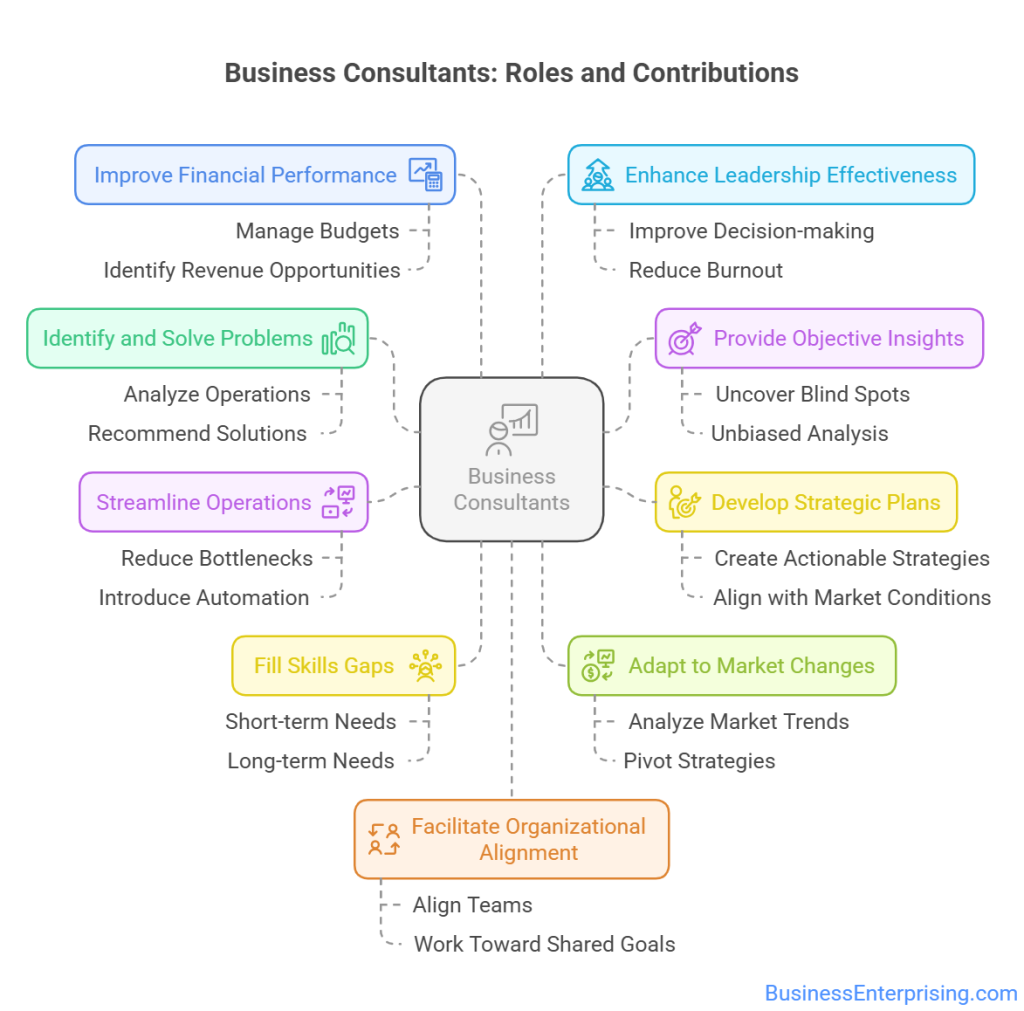 Running a business often comes with challenges that can feel overwhelming. Whether it’s declining revenue, inefficiencies, or leadership burnout, these problems can hinder your progress. However, recognizing when outside expertise is necessary can be the key to overcoming these obstacles and regaining focus. There are clear signs your business needs a consultant, and acting on them can drive meaningful change.
Running a business often comes with challenges that can feel overwhelming. Whether it’s declining revenue, inefficiencies, or leadership burnout, these problems can hinder your progress. However, recognizing when outside expertise is necessary can be the key to overcoming these obstacles and regaining focus. There are clear signs your business needs a consultant, and acting on them can drive meaningful change.
Consultants bring a fresh perspective and expertise that can help you tackle complex issues. Additionally, they identify opportunities for growth and provide practical solutions tailored to your needs. Whether you’re struggling with unclear strategies, resource shortages, or adapting to market changes, their insights can guide your business toward success.
Ignoring these challenges for too long can lead to missed opportunities and stagnation. Therefore, taking proactive steps to address them ensures you stay competitive and prepared for future growth. By identifying the signs early, you can take action that benefits your business and sets you on a path to sustainable success.
Declining Revenue and Profit Margins
Declining revenue and shrinking profit margins are clear indicators that something isn’t working within your business operations. Whether it’s due to increased competition, inefficiencies, or market changes, consistent financial setbacks often point to underlying problems that require expert attention. Ignoring these issues can make it harder for your business to recover and regain its competitive edge.
However, addressing these challenges on your own can be overwhelming. You may lack the objectivity or time needed to identify the root causes of declining performance. Additionally, focusing solely on short-term fixes could mask deeper issues affecting your profitability. This is one of the signs your business needs a consultant. A professional consultant can analyze your financial data, identify inefficiencies, and recommend targeted solutions to improve your bottom line.
Furthermore, declining revenue often signals operational inefficiencies or missed opportunities. For instance, outdated processes may hinder productivity, or your pricing strategy may no longer align with market demands. A consultant can provide the external perspective necessary to spot these gaps and implement changes that drive long-term success. By addressing these financial setbacks now, you can position your business for future growth.
Bringing in outside expertise helps you make sense of complex financial challenges. Consultants not only offer solutions but also help you navigate market shifts and align your goals with achievable outcomes. When revenue and profit margins decline, expert guidance can turn those challenges into opportunities for transformation.
Inefficient Business Processes
Inefficient business processes can create significant challenges for your operations, leading to delays, higher costs, and reduced productivity. Operational bottlenecks are often signs of underlying issues that require attention. For example, outdated workflows or manual systems may no longer meet the demands of a growing business. Over time, these inefficiencies can hinder your ability to stay competitive and adapt to market changes.
However, identifying these inefficiencies on your own can be challenging. Familiarity with existing processes may prevent you from spotting areas for improvement. Additionally, lack of automation or reliance on manual tasks may limit your ability to scale. These are clear signs your business needs a consultant. A consultant can bring a fresh perspective, helping you pinpoint bottlenecks and recommend modern tools to streamline your operations.
Outdated workflows often mean your team is spending too much time on repetitive tasks or navigating unnecessary steps. By addressing these inefficiencies, you can free up resources for higher-value activities. Consultants can assess your processes objectively, identifying opportunities for automation and integration. Their expertise can help you transition from outdated systems to more efficient, scalable solutions.
Bringing in external expertise helps you uncover solutions tailored to your unique needs. A consultant’s recommendations can reduce bottlenecks, improve workflows, and boost overall efficiency. Addressing inefficient processes now positions your business to save time, reduce costs, and achieve sustainable growth in the future.
Struggling to Adapt to Market Changes
Struggling to adapt to market changes is a challenge many businesses face, especially in rapidly evolving industries. Missed opportunities, declining sales, or falling behind competitors often point to underlying issues. These could include an inability to keep up with industry trends or failure to address shifting customer needs. Over time, these struggles can weaken your position in the market.
However, recognizing these issues and addressing them internally can be overwhelming. You may lack the resources or expertise to identify effective solutions. Additionally, hesitation to change existing strategies can prevent your business from staying competitive. These are signs your business needs a consultant. A consultant can help you analyze market trends, identify gaps, and develop strategies to respond effectively to change.
Market shifts require businesses to innovate and pivot quickly. If your competitors are introducing new products or adopting emerging technologies, staying stagnant puts you at a disadvantage. A consultant brings industry expertise and an objective perspective to help you navigate these challenges. They can guide you in rethinking outdated approaches and embracing opportunities to regain momentum.
Adapting to market changes is essential for long-term success. By working with a consultant, you gain valuable insights and actionable strategies tailored to your business. Addressing market challenges now positions your business to stay competitive, seize new opportunities, and thrive in an ever-changing environment.
Lack of Clear Strategic Direction
A lack of clear strategic direction can create serious obstacles for your business. Unclear goals and disjointed plans often lead to confusion and inefficiency. When teams are unsure about priorities, productivity suffers, and progress slows. Over time, this lack of focus can prevent your business from achieving its potential.
However, internal disagreements about strategy can make it even harder to align efforts and move forward. Different departments may prioritize conflicting goals, creating miscommunication and frustration. Additionally, without a unified vision, it becomes difficult to measure progress or adapt to changes. These challenges are common signs your business needs a consultant. A consultant can provide the clarity and structure needed to get everyone on the same page.
Bringing in a consultant allows you to take a step back and evaluate your current direction objectively. They can help you define realistic goals and create actionable plans that align with your business’s mission. By addressing internal disagreements and identifying shared priorities, a consultant ensures your team works cohesively toward common objectives.
Clear strategic direction is essential for achieving growth and maintaining momentum. A consultant’s expertise can help you refocus, streamline decision-making, and improve collaboration across your organization. When goals are aligned and plans are cohesive, your business becomes better equipped to adapt and succeed.
Internal Skills Gaps or Resource Shortages
Internal skills gaps or resource shortages can significantly slow your business’s growth and ability to meet goals. These limitations often emerge as your business scales or faces new challenges. For example, a lack of specialized expertise can hinder your ability to adopt new technologies or execute complex projects efficiently. Over time, these gaps can impact productivity and delay critical initiatives.
However, resource shortages go beyond skills. Limited manpower or insufficient tools can stretch your team too thin, leading to burnout and reduced performance. Additionally, relying on your current team to fill skill gaps may not always be feasible. These are signs your business needs a consultant. A consultant can step in to address these gaps, providing the expertise or additional resources you need to maintain momentum.
Consultants offer flexible solutions to meet your unique needs. They can provide temporary support for short-term projects or help establish permanent processes to close ongoing gaps. Their external perspective helps identify inefficiencies and opportunities that internal teams might overlook. Additionally, consultants can assist in training your staff, ensuring your team gains the knowledge required to manage future challenges.
Addressing skills gaps and resource constraints is essential to sustaining growth. Consultants bring valuable expertise and fresh ideas, enabling your business to overcome hurdles quickly. By bridging these gaps, you position your business to operate more efficiently, take on new opportunities, and achieve long-term success.
Overwhelmed Leadership or Burnout
Overwhelmed leadership and burnout are growing challenges for many businesses. When leaders take on too many responsibilities, decision-making suffers, and productivity declines. Long hours and constant pressure can lead to exhaustion, making it difficult to focus on long-term goals. Over time, this not only impacts leaders but also the entire organization.
However, addressing leadership burnout requires more than temporary solutions. You may find it hard to delegate tasks or prioritize effectively without an external perspective. Additionally, the demands of managing day-to-day operations often leave little time for strategic planning. These are signs your business needs a consultant. A consultant can help relieve pressure by taking on specific tasks or providing guidance for sustainable growth.
Consultants bring fresh ideas and objective insights to ease the burden on decision-makers. They can identify inefficiencies, recommend improvements, and help your team create more balanced workloads. By focusing on critical areas, consultants allow leaders to regain clarity and focus on high-level priorities. This collaboration supports healthier leadership and sets the stage for long-term success.
Preventing burnout is essential for maintaining strong leadership and guiding your business forward. With outside expertise, you can create strategies that reduce stress and improve efficiency. Working with a consultant provides the support needed to manage challenges effectively and maintain growth without sacrificing well-being.
Conclusion
Recognizing the signs your business needs a consultant can make a significant difference in your ability to address challenges effectively. Whether you’re facing declining revenue, inefficient processes, or leadership burnout, external expertise provides the clarity and support required to move forward. Consultants offer valuable perspectives and tailored solutions that align with your goals.
However, waiting too long to seek help can compound existing problems. Addressing challenges early allows you to regain control and also set a clear path for growth. Additionally, consultants bring experience and tools that streamline processes, improve efficiency, and strengthen decision-making across your organization. These benefits help you overcome obstacles and position your business for long-term success.
Investing in a consultant demonstrates your commitment to solving problems and achieving sustainable growth. Their guidance helps you navigate change, manage resources, as well as maintain focus on high-priority goals. By taking action now, you empower your business to thrive in an ever-changing environment.



